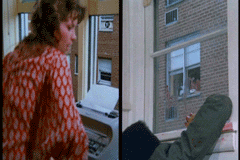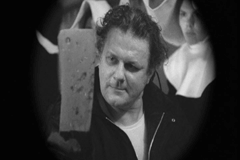Sisters (Brian De Palma) 1973
 Sisters is the first Hitchcock homage that Brian De Palma directed, and
it’s a doozy. There are scenes in any horror film that put the viewer on edge.
Right before the slasher slashes his victim or before the monster eats his prey,
a good director will rile us up. Sisters
takes Hitchcock’s famous comment that he plays his audience like a fiddle to
heart, and De Palma makes the first forty-five minutes of the film feel like
anyone on screen is about to get hacked up, if only the bogeyman would jump out
of the shadows. While there are films, like 1994’s Mute
Witness, that offer a similarly distilled horror show, what’s amazing is
that De Palma manages to create the sense of a threat without actually revealing
the film as a horror film or showing us much action that’s in any way
dangerous. He’s obsessing on details and using his camerawork to underline
certain dialogue so that we know there must be a point to it all. Obviously,
this narrative device has been lifted from Psycho,
but it’s almost one-upped here since Sisters
relies on fewer red herrings and is more up-front that we’re being teased,
turning the passing of time without incident into a game instead of a
frustration. The events that actually happen in the first half of the movie are
so mundane that the suspense feels illogical even as it mounts, and as a result,
it has a giddying effect. You know that the director is setting things up, and
you can’t wait for the punch line to rear its head. It’s almost a shame that
it has to end and launch the film’s plot properly.
Sisters is the first Hitchcock homage that Brian De Palma directed, and
it’s a doozy. There are scenes in any horror film that put the viewer on edge.
Right before the slasher slashes his victim or before the monster eats his prey,
a good director will rile us up. Sisters
takes Hitchcock’s famous comment that he plays his audience like a fiddle to
heart, and De Palma makes the first forty-five minutes of the film feel like
anyone on screen is about to get hacked up, if only the bogeyman would jump out
of the shadows. While there are films, like 1994’s Mute
Witness, that offer a similarly distilled horror show, what’s amazing is
that De Palma manages to create the sense of a threat without actually revealing
the film as a horror film or showing us much action that’s in any way
dangerous. He’s obsessing on details and using his camerawork to underline
certain dialogue so that we know there must be a point to it all. Obviously,
this narrative device has been lifted from Psycho,
but it’s almost one-upped here since Sisters
relies on fewer red herrings and is more up-front that we’re being teased,
turning the passing of time without incident into a game instead of a
frustration. The events that actually happen in the first half of the movie are
so mundane that the suspense feels illogical even as it mounts, and as a result,
it has a giddying effect. You know that the director is setting things up, and
you can’t wait for the punch line to rear its head. It’s almost a shame that
it has to end and launch the film’s plot properly.
 Once De Palma’s initial game ends, the film doesn’t lose much. Sisters
becomes an energetic reference to the great scenes and themes of Hitchcock’s
work. Beyond Psycho’s plot
structure, we get Norman Bates’ motivation. Vertigo’s
psychological premise (the obsessive seeker creates the object of obsession in
its absence), a body hidden in an apartment (taken from Rope), a Bernard Herrmann score, and Rear Window’s crime solving via voyeurism also turn up here. Even
if the abundance of such themes don’t manage to make Sisters better than the combined work of Hitchcock, they all
integrate well into the tale that the director tells. Certainly, Sisters
feels less constrained by the indebtedness caused by creating homage than De
Palma’s later works like Dressed to Kill
or Obsession. De Palma’s constantly winking eye and his
juxtapositions of horror and humor keep us interested as the film slides into
logical implausibility. Though the performances are solid, the director is
clearly the star of this show. As such, Sisters
is the first De Palma film that I’ve seen that I would deem great, and the
first one that makes me feel Pauline Kael’s famously rapturous praise of the
director was completely founded*.
Once De Palma’s initial game ends, the film doesn’t lose much. Sisters
becomes an energetic reference to the great scenes and themes of Hitchcock’s
work. Beyond Psycho’s plot
structure, we get Norman Bates’ motivation. Vertigo’s
psychological premise (the obsessive seeker creates the object of obsession in
its absence), a body hidden in an apartment (taken from Rope), a Bernard Herrmann score, and Rear Window’s crime solving via voyeurism also turn up here. Even
if the abundance of such themes don’t manage to make Sisters better than the combined work of Hitchcock, they all
integrate well into the tale that the director tells. Certainly, Sisters
feels less constrained by the indebtedness caused by creating homage than De
Palma’s later works like Dressed to Kill
or Obsession. De Palma’s constantly winking eye and his
juxtapositions of horror and humor keep us interested as the film slides into
logical implausibility. Though the performances are solid, the director is
clearly the star of this show. As such, Sisters
is the first De Palma film that I’ve seen that I would deem great, and the
first one that makes me feel Pauline Kael’s famously rapturous praise of the
director was completely founded*.
 *
Ironically, I looked up Kael's review of Sisters after posting this and
noticed that she actually gave it a negative notice! How funny that I appreciate
the things here that she loved in his more recent films, and I found a lot of
the same stuff tiresome in those later works... Oh well...
*
Ironically, I looked up Kael's review of Sisters after posting this and
noticed that she actually gave it a negative notice! How funny that I appreciate
the things here that she loved in his more recent films, and I found a lot of
the same stuff tiresome in those later works... Oh well...
* * * *
12-05-01
Jeremy Heilman